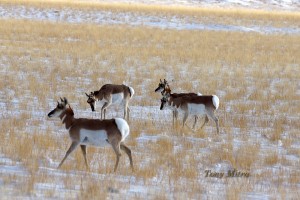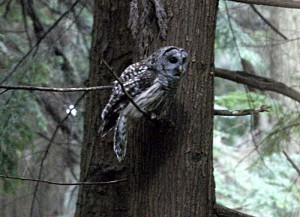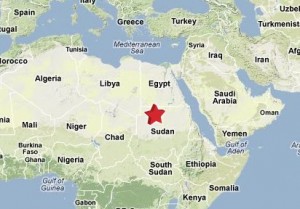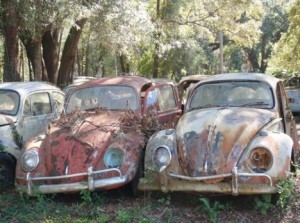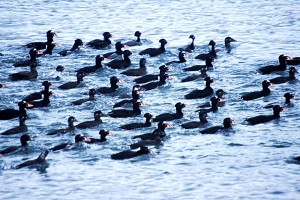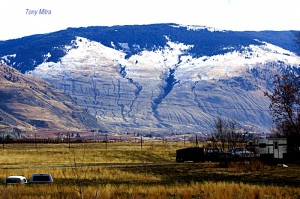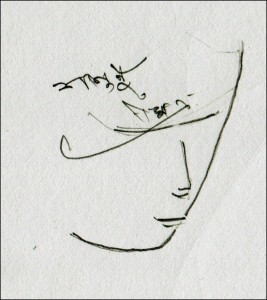I looked at list of items before me. There were the pronghorns, feisty little pseudo-antelopes from Montana.
——————————————
“Pronghorns are interesting animals. I heard they do not like jumping fences”, Neil observed. “Instead, they prefer to crouch and go under the lowest opening, the lowest line of a wire fence.”
“Really?”
“Well, I did not see them crossing a fence myself. But I heard from our tour guide in Yellowstone.”
They were glancing through pictures on his iPad, clicked just a few months ago, at the turn of the year, mostly in Montana and British Columbia. A group of pronghorns were browsing the brownish grass on a field lightly covered in snow by the side of the highway. Neil was driving east towards Yellowstone and stopped by the roadside, clicking off a few shots through his window. He usually kept one digital camera with a long lens on the passenger seat beside him, and another smaller pocket type camera in hanging off his neck.
——————————————
The story was moving in fits. I wondered if it was right to engage Neil speaking with Mabel about pronghorns. He had barely managed one scene with a second woman, a single mother named Karen. Her child still did not have a name, partly because I could not think of one. Without developing that side of the story and giving it some shape and texture, I had instead brought Mabel back, and tossed a group of pronghorns on her lap – pronghorns that did not like jumping fences.
They were not true antelopes, these pronghorns. Antelopes were essentially grazing mammals from the old world. In the new world, pronghorns were artiodactyls that look similar to antelopes due to convergent evolution. Now, if he was to explain convergence in evolution to Mabel, through Neil, or let both of them search it out, there was going to be several pages written about that animal. Besides, the term ‘old world’ and ‘new world’ was wrong. The north and south American continents were discovered by modern Anglo Saxon men only five hundred years ago, while indigenous Asians had already walked into them some twelve thousand years back. The continents themselves have been around, in different forms and arrangements, as long as other continents. Calling the American continents as ‘new world’ based on todays knowledge, felt a bit stupid.
I decided to be careful in future, in using the established but wrong terminology of old and new world. Perhaps we owed it to ourselves to use better representative adjectives for such issues. But, the question was the direction of the story.
As it is, pronghorns were the sole surviving species of a larger family of Ruminant Artiodactyls that were present when man first stepped onto the savannah. I had no doubt that arrival of man, the ultimate hunter, was at least partially responsible for the extinction of all those species, except for the pronghorns. That goes to show that early man was as destructive as modern man, in annihilating and eating through entire genera of the animal kingdom if he cold. The only difference is, being hunter gatherers, their numbers were small, and they did not possess the technology to speed up their activity. Modern man does everything super fast – including denegration of this planet’s ecosystem and causing mass extinction of species.
But, again, the story was supposed to focus on a few people and not on the whole biosphere and the future of mankind ! I wondered if discussions of this kind should deserve a number of pages in a story that was essentially about Neil and his search for a root in Canada.
There were three women and one man in the story already – a story that was still searching for a theme. Two of the women lived in the present, both in Canada. That was because the main character in the story, Neil, was sort of an alter ego of myself, who, like myself, also lived in Canada, but was of Indian descent. Indian descent might mean different things to different people. Hereabouts, Indians can mean people from West Indies. Down south in the US, Indian can mean American Indian tribes. Anyhow, if was after I arrived in Canada, that I learned a new name for my kind – east Indian. This distinguishes me from a west Indian. The original inhabitants of the land here are not called Indians or American Indians, but first nation.
I felt a bit odd about being called East Indian. After all, the term Indian, when applied to either American tribals or people from West Indies, was due to a gargantuan mistake in geography by Christopher Columbus. India, or the land I was born in, was the one and only India, and all others were mistakenly linked to it. Therefore, I should be an Indian – end of story. All others may be called new Indian, green Indian or, preferably by their own names, such as Apache or Blackfoot or Maya etc. Being called an East Indian was, I found, odd, and again, perpetuating that greatest mistake of geography by Columbus.
Anyhow, back to the story.
I glanced at my notebook. I had jotted a few places and things on it, as potential sub-topics for the story. Next to the pronghorns, I had written two words – Burgess Shale. And next to it I had also jotted a few words that related to the human genome, and that of the living creatures of this planet. There were RNA, DNA, gene, chromosome etc there. I had also jotted items such as evolution, and geology. There was a bewildering mix of topics, none of which seemed directly linked to Neil’s effort to blend in his adopted country – Canada.
I went to the bathroom and prepared to take a shower, still thinking about it all. Perhaps I should leave the genetics but touch upon Burgess Shale.
A pronghorn and Burgess shale had little to do with each other, except for a proximity in the map of north America. I saw most of the pronghorns in northern Montana, not far from the Canadian border. And Burgess Shale was only a bit to the north across the border in British Columbia.
Apart from that, there was no similarity. Burgess shale was famous not because of animals that roam there right now, but because animals that lived over five hundred million years ago in a shallow tropical ocean. These sea animals were the products of the Cambrian explosion – the first of the Cambrian multi cellular large creatures of the sea that were to give rise of all living animals of the world today, including the first of the known chordata, or animals with a central backbone. There were foot long trilobites and other creatures with an exoskeleton, as well as worm like creatures that showed signs of rudimentary central column, or a spine.
The planet at the time did not have animals, or plants of insects on the land or in the air. Life only existed in the sea, and there was an explosion of new species coming up at an incredibly fast rate. That was why scientists call it the Cambrian explosion.
These marine creatures sometimes got buried by mud due to the special underwater cliff like arrangement of the continental shelf of the time. These soft bodied creatures buried in fine silt and mud eventually got fossilized. The continent was at the time right angle and horizontal over the equator. But over time turned itself ninety degree around and travelled north to its current location. Different blocks of it got clubbed together or torn apart. What is southern British Columbia today, was that shallow ocean with buried earliest of creatures. Tectonic forces engaged in mountain building, and the fossilized creatures ended up high on the mountains of the Rockies, in British Columbia in Burgess Shale. Today, it is recognized as one of the best locations for fossils of the earliest of the animal kingdom.
It was about ten hours drive from my home.
But, should there be pronghorns and fossils of Burgess Shale in the conversation with Mabel? What would be relevant for the story?
I sighed as I dried myself off in the shower stand. I did not know what should be relevant for a reader. I knew I liked all those multi directional threads, and snippets, from the past and the present, that, together made up what this planet and this land is all about. It is natural for me to watch life at the surface and let my thoughts drift below that surface to pry out what took place in the past and what might happen in the future. The present was just a point in the space-time coordinate, and my banging the keyboard was a collection of events that played only a marginal role in the game of dice that propelled existence as we know it – towards its unknown destiny.
I had seen the pronghorns, but had not been to Yoho National park yet, though I drove past it a few times. Ir was in that park that Burgess Shale was located. There was also the Burgess Shale Geoscience Foundation nearby, in the town of Field, BC.’ It would be a whole days drive through serpentine mountain roads. I had done it before. The journey would be as pleasing as the destination might be thrilling. Add a 22 Km round trip through mountain slopes and a climb of perhaps over two thousand feet, to reach some of the fossil beds there. The place was out of bounds except by guided tours of less than a dozen individual at a time. I was not sure I could do the 22 Km hilly trek a day and still have time to check the fossil beds. One would need to start at around 7 in the morning and be back before dark.
Pronghorns were easier.
—————————–
“They look so cute. I have never seen these deers.”
“Well, I am not sure these should be called deers, Mabel. Of course, there are lots of deers in America and Canada. But these are not among them. Some call them antelopes, because they have sort of permanent horns, like old world antelopes. But this animal is not a true antelope, and the horns themselves are different – actually they are projected bones from their skull. The animal just looks like the antelopes of the old world – I mean from Eurasia and Africa. It is a Ruminant Artiodactyl, and the last surviving species in its family.”
“Wow. Whats a Ruminant whatever ?”
“Artiodactyl. That means a hoofed animal that has even number of hooves on its feet. It has to be either two or four. It is classed differently than hoofed animals that have odd number of hoofs. The difference is in the way weight is distributed through their legs. An even hoofed animal has multiple hooves that sort of shares the load and the centre of gravity runs through the middle of its feet with the hooves arranged on each side of it. But for an animal with odd number of hoofs, the centre of gravity runs through the central hoof”.
Mabel watched him. “And give me an example of each type, Mr. Neil Dusty, if you will”, she said with mock seriousness. She was both fascinated by the topic and equally fascinated by the way he described these issues.
“Well, pretty much most of the hoofed animals you know are even-toed angulates, or artiodactyla. This includes all domesticated hoofed mammals. A cow, a buffalo, a lamb, a goat, a pig, as well as deers and antelopes are all examples of it”, Neil said. He picked up a cream cracker from the plastic box before them. They were sitting on a woven mat on a field near the river mouth. It was a sunny clear skied afternoon. A gentle breeze was blowing. It was still cold in March, and both of them kept their Parka on. Neil had taken his shoe off and stretched his feet forward, leaning back on his arms.
“Hmm, ok. And how about the other kind?’
“Odd toed ungulates are called Perissodactyla. There are a few rather famous animals in it – a horse, a donkey, a rhinoceros.”
“Ohh cool. A rhino! They all have a single hoof?”
“Nope. A horse and a donkey does. But a rhino has three hoofs. So, a Rhino is a closer relative of a horse than a moose or a cow.”
—————————————–
I stepped off the shower and watched myself on the mirror and tried to see a similarity between myself, a pronghorn a trilobite, a rhinoceros and a scavenging anthropoid from Burgess Shale.
Similarity of not, I got them into the story already, not to mention an ice age nomadic woman from central Asia for good measure. Neil an Mabel were just talking about animals and soon might also talk about mitochondria and ice age women. What they did not seem to do, was the most normal things that two humans might do when in a sort of relationship – talk about each other. More than talk, they needed to relate to each other, act on and about each other and try to overlap each others sphere a bit. That was what relationship was all about, was it not?
I looked at myself in the mirror, and focussed on the nails on my fingers. Come to think of it, a hoof was only a modified nail. And a nail was only a modified scale from our reptilian common ancestry, I thought. This was just a guess from me. I had not read it anywhere, but it seemed logical to me. The scales came from fishes, onto the first of the animals that got on land and needed a water tight body, unlike the amphibians. This allowed them to venture far from water. But, development of water tight skin made scales somewhat unnecessary. Hair was evolved down the line, I suppose, as a result of finding natural insulation for the body, in cases where body fat for the same purpose was not desirable.
I had a bathrobe that came in handy. Stepping into my shorts and the bathrobe, I shuffled bare feet to the kitchen downstairs to make a coffee.
I might think about it some more. There was a four day vacation coming – Good Friday and Easter Monday. That was in April. I wondered if that might be a good time to drive to Yoho National Park and take a look at the fossils of the time.
—————————————–
Mabel liked flipping through the pictures by brushing her fingers across the face of the iPad screen. She liked how the images moved sideways. But more importantly, he took wonderful pictures. There was a landscape in stark black and white world with rising steam and hot water across a snow covered landscape – of Yellowstone national park in winter. Neil had not told Mabel about going there, alone. Had be offered, she would have gone with him. It would have been so romantic.
She turned and watched him a moment, as Neil spoke about how close to the surface the hot mantle of the planet was at Yellowstone and how thin the crust was.
She took his face in her hands and kissed his mouth.
“I love you.”
That shut him up.

